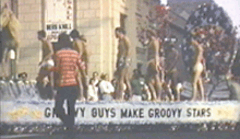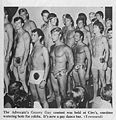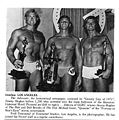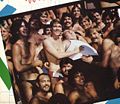Difference between revisions of "Groovy guy contest"
m (Unprotected "Groovy guy contest") |
MarkDilley (talk | contribs) (add a few FutureLinks as invitations for people to add those pages and add list for contestants. Please revert if wanted) |
||
| Line 2: | Line 2: | ||
(c)2010 | (c)2010 | ||
| − | The Groovy Guy contest was started by Sam Winston in 1968 as a marketing tool for the then newly formed ''Advocate'' magazine and as a way to unite the Los Angeles gay community around a contest that moved away from drag events. The contest can be seen as the start of the split in the early seventies between the GLBT community. The co-sponsoer for the first contest was the gay club The Hayloft, where the first contest was held. | + | The Groovy Guy contest was started by Sam Winston in 1968 as a marketing tool for the then newly formed ''Advocate'' magazine and as a way to unite the Los Angeles gay community around a contest that moved away from drag events. The contest can be seen as the start of the split in the early seventies between the GLBT community. The co-sponsoer for the first contest was the gay club [[The Hayloft]], where the first contest was held. |
| Line 25: | Line 25: | ||
| − | By 1970 the contest had become so famous that The Advocate featured a Groovy Guy float in the first gay pride parade down Hollywood Boulevard in June 1970. | + | By 1970 the contest had become so famous that [[The Advocate]] featured a Groovy Guy float in the first gay pride parade down Hollywood Boulevard in June 1970. |
[[Image:1Parade70.gif]] | [[Image:1Parade70.gif]] | ||
| Line 31: | Line 31: | ||
| − | Starting with the 1970 event rumors in the community started circulating that the contest was fixed. These rumors increased each year and started causing some damage to the Advocate's reputation. In addition to this people accused the contest of making money off the community and not putting it back in despite the fact that the Advocate gave donations to the Metropolitan Community Churh and the Los Angeles Gay Community Center. Filmaker Pat Rocco started filming the events in this year. The winner of that year was Larry Schramm (sponsored by the Jaguar Club), the 1rst runner up was Chico Rodriguez (of the Little Club) and the 2nd runner up was Jim Cassidy (sponsored by Bizarre Productions). | + | Starting with the 1970 event rumors in the community started circulating that the contest was fixed. These rumors increased each year and started causing some damage to the Advocate's reputation. In addition to this people accused the contest of making money off the community and not putting it back in despite the fact that the Advocate gave donations to the Metropolitan Community Churh and the [[Los Angeles Gay Community Center]]. Filmaker Pat Rocco started filming the events in this year. The winner of that year was Larry Schramm (sponsored by the Jaguar Club), the 1rst runner up was Chico Rodriguez (of the Little Club) and the 2nd runner up was Jim Cassidy (sponsored by Bizarre Productions). |
| Line 84: | Line 84: | ||
| − | By 1975 the event had changed to the title of California Groovy Guy Contest. That year Cal Coburn and C/C Productions produced the show and held it at the International Hotel in Los Angeles on Sunday, August 31. There were 26 contestants that year(with their sponsors in parentheses):Hank Russell (H.E.L.P. Los Angeles) | + | By 1975 the event had changed to the title of California Groovy Guy Contest. That year Cal Coburn and C/C Productions produced the show and held it at the International Hotel in Los Angeles on Sunday, August 31. There were 26 contestants that year (with their sponsors in parentheses) |
| − | Dell Duff (Mike's Corral & Fist-A-Cuffs, Long Beach) | + | : Hank Russell (H.E.L.P. Los Angeles) |
| − | Jimmy (Buzzby's, San Francisco) | + | : Dell Duff (Mike's Corral & Fist-A-Cuffs, Long Beach) |
| − | Lynn Lloyd (Kelly Bray, Hollywood) | + | : Jimmy (Buzzby's, San Francisco) |
| − | Dean (Longhorn Saloon, Hollywood) | + | : Lynn Lloyd (Kelly Bray, Hollywood) |
| − | Greg Colb (Cabaret, Hollywood) | + | : Dean (Longhorn Saloon, Hollywood) |
| − | Craig Bowman (Serpent '8' Club, Burbank) | + | : Greg Colb (Cabaret, Hollywood) |
| − | Wayne Finks (Pacific Coast Times, San Diego) | + | : Craig Bowman (Serpent '8' Club, Burbank) |
| − | Don McClintock (Pit Stop, Gardena) | + | : Wayne Finks (Pacific Coast Times, San Diego) |
| − | Ron Raz (The Windjammer, San Francisco) | + | : Don McClintock (Pit Stop, Gardena) |
| − | Michael Daniels (Jac Masters, Los Angeles) | + | : Ron Raz (The Windjammer, San Francisco) |
| − | Ral Majal (SPREE & Newswest, Los Angeles) | + | : Michael Daniels (Jac Masters, Los Angeles) |
| − | Steve Bailey (C.I.E. Royal Court, Pomona) | + | : Ral Majal (SPREE & Newswest, Los Angeles) |
| − | Tony (Zelda's Corte Madera) | + | : Steve Bailey (C.I.E. Royal Court, Pomona) |
| − | Jim Dion (The Store, North Hollywood) | + | : Tony (Zelda's Corte Madera) |
| − | Bruce Anderson (Party Room & Mardi Gras Motel, Palm Springs) | + | : Jim Dion (The Store, North Hollywood) |
| − | Neal Ahlfinger (G.G.R.C., Los Angeles) | + | : Bruce Anderson (Party Room & Mardi Gras Motel, Palm Springs) |
| − | Louie Young (Garden District, Hollywood) | + | : Neal Ahlfinger (G.G.R.C., Los Angeles) |
| − | Don Schultz (Alibi East, Pomona) | + | : Louie Young (Garden District, Hollywood) |
| − | Lance Strugar (River Club, Los Angeles) | + | : Don Schultz (Alibi East, Pomona) |
| − | Bill Dean (Data-Boy, San Francisco) | + | : Lance Strugar (River Club, Los Angeles) |
| − | Dale Layne (Studio One, Hollywood) | + | : Bill Dean (Data-Boy, San Francisco) |
| − | Lowell Gray (Waltzing Bugle, Los Angeles) | + | : Dale Layne (Studio One, Hollywood) |
| − | Rich Talal (The Annex, Inglewood) | + | : Lowell Gray (Waltzing Bugle, Los Angeles) |
| − | Jimmy (Zero to Success, Hollywood) | + | : Rich Talal (The Annex, Inglewood) |
| − | Jim Standridge (Ball Express Picassos's, San Diego) | + | : Jimmy (Zero to Success, Hollywood) |
| + | : Jim Standridge (Ball Express Picassos's, San Diego) | ||
| + | |||
The contest that year featured: Pre-Show Entertainment featuring Go-Go Dancers; "Competition in jeans and CALIFORNIA GROOVY GUY Tank Tops"; "Competition in swimsuits"). | The contest that year featured: Pre-Show Entertainment featuring Go-Go Dancers; "Competition in jeans and CALIFORNIA GROOVY GUY Tank Tops"; "Competition in swimsuits"). | ||
| Line 119: | Line 121: | ||
| − | Data-Boy Magazine continued the pagent changing the name in 1978 to the Data-Boy '78 Pageant and in 1979 the Data-Boy Super-Men Pagent. | + | [[Data-Boy Magazine]] continued the pagent changing the name in 1978 to the Data-Boy '78 Pageant and in 1979 the Data-Boy Super-Men Pagent. |
By 1980 the name had been shortened to the Super-Men pagent and ran through 1991. | By 1980 the name had been shortened to the Super-Men pagent and ran through 1991. | ||
Revision as of 08:01, 18 July 2012
By Jeff Auer (c)2010
The Groovy Guy contest was started by Sam Winston in 1968 as a marketing tool for the then newly formed Advocate magazine and as a way to unite the Los Angeles gay community around a contest that moved away from drag events. The contest can be seen as the start of the split in the early seventies between the GLBT community. The co-sponsoer for the first contest was the gay club The Hayloft, where the first contest was held.
The event was organized by Bob Barnett and John Charles, of Too Guys Productions, with the Adovcate staff doing advertising. The first contest had seven contestants and 150 people in the audience at the August 19th event. Local LA area bars submitted applicatants to be considered for the contest. The bars that participated in the first event were: The Blue Angel West, De Paul's, Klondike, Right Pocket, River Club, Sax Club, Seventh Keg, Tony Honker and the Valli Haus.
Word of mouth created such a buzz that by the following year there were 18 contestants and 700 people in the audience.
By 1970 the contest had become so famous that The Advocate featured a Groovy Guy float in the first gay pride parade down Hollywood Boulevard in June 1970.
Starting with the 1970 event rumors in the community started circulating that the contest was fixed. These rumors increased each year and started causing some damage to the Advocate's reputation. In addition to this people accused the contest of making money off the community and not putting it back in despite the fact that the Advocate gave donations to the Metropolitan Community Churh and the Los Angeles Gay Community Center. Filmaker Pat Rocco started filming the events in this year. The winner of that year was Larry Schramm (sponsored by the Jaguar Club), the 1rst runner up was Chico Rodriguez (of the Little Club) and the 2nd runner up was Jim Cassidy (sponsored by Bizarre Productions).
By 1971 the event had become so popular that there were Groovy Guy contests springing up all across the United States, although the one in Los Angeles remained the first and biggest. The next event was held August 21, 1971 event at the Sheraton Universal Hotel. There were 25 contestents.
The last contest was held August 25, 1972 in the Grand Ballroom of the International Hotel in Los Angeles. 1500 people showed up to watch 29 contestents. The program was beset by accidents and illnesses that caused The Advocate to realize that the show was no longer worth all the energy that went into promoting it. In addition by that time the contest had lost a lot of luster as naked dancers became common in gay bars by that time. It was the forerunner of gay beauty pagents.
The contest was replaced in 1973 by the founders of Data-Boy, Saul (Fat Shirley)Sufron, and Entertainment West magazines, working with Barnett and Charles with the Groovy Stud Contest. The first Groovy Stud contest was held July 21, 1973 at the Mayflower Balloroom in Inglewood California for an audience of 450 with 32 contestants entering. The winner that year was 26 year old Bill Shepard, who was sponsored by the Kingmasters Social Club.
By 1974, the winner of the 1971 contest was under charges for kidnapping and rape of several girls, which led to some tarnishing of the contest title.
By 1975 the event had changed to the title of California Groovy Guy Contest. That year Cal Coburn and C/C Productions produced the show and held it at the International Hotel in Los Angeles on Sunday, August 31. There were 26 contestants that year (with their sponsors in parentheses)
- Hank Russell (H.E.L.P. Los Angeles)
- Dell Duff (Mike's Corral & Fist-A-Cuffs, Long Beach)
- Jimmy (Buzzby's, San Francisco)
- Lynn Lloyd (Kelly Bray, Hollywood)
- Dean (Longhorn Saloon, Hollywood)
- Greg Colb (Cabaret, Hollywood)
- Craig Bowman (Serpent '8' Club, Burbank)
- Wayne Finks (Pacific Coast Times, San Diego)
- Don McClintock (Pit Stop, Gardena)
- Ron Raz (The Windjammer, San Francisco)
- Michael Daniels (Jac Masters, Los Angeles)
- Ral Majal (SPREE & Newswest, Los Angeles)
- Steve Bailey (C.I.E. Royal Court, Pomona)
- Tony (Zelda's Corte Madera)
- Jim Dion (The Store, North Hollywood)
- Bruce Anderson (Party Room & Mardi Gras Motel, Palm Springs)
- Neal Ahlfinger (G.G.R.C., Los Angeles)
- Louie Young (Garden District, Hollywood)
- Don Schultz (Alibi East, Pomona)
- Lance Strugar (River Club, Los Angeles)
- Bill Dean (Data-Boy, San Francisco)
- Dale Layne (Studio One, Hollywood)
- Lowell Gray (Waltzing Bugle, Los Angeles)
- Rich Talal (The Annex, Inglewood)
- Jimmy (Zero to Success, Hollywood)
- Jim Standridge (Ball Express Picassos's, San Diego)
The contest that year featured: Pre-Show Entertainment featuring Go-Go Dancers; "Competition in jeans and CALIFORNIA GROOVY GUY Tank Tops"; "Competition in swimsuits").
Data-Boy Magazine continued the pagent changing the name in 1978 to the Data-Boy '78 Pageant and in 1979 the Data-Boy Super-Men Pagent.
By 1980 the name had been shortened to the Super-Men pagent and ran through 1991.
























































